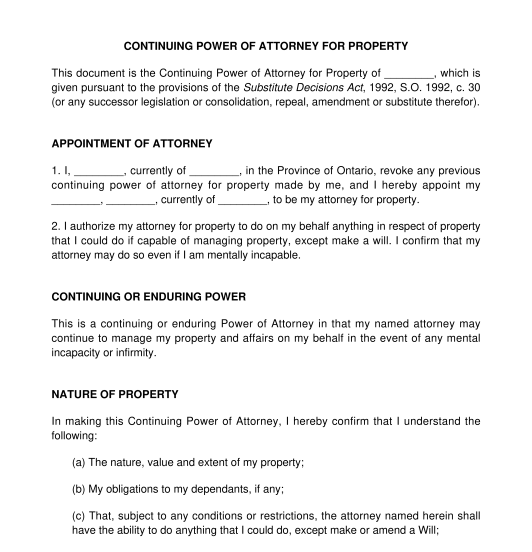 01/10/2025
01/10/2025

Answer a few questions and your document is created automatically.

Your document is ready! You will receive it in Word and PDF formats. You will be able to modify it.

 01/10/2025
01/10/2025
 Word and PDF
Word and PDF
 2 to 3 pages
2 to 3 pages
A Continuing Power of Attorney for Property is a legal document in which a person (the grantor) gives someone else the legal authority to make decisions about their finances. In this context, the word attorney does not mean lawyer; rather, it means agent. The power of attorney is called "continuing" because it can be used after the person who gave it is no longer mentally capable of making financial decisions themselves.
Each jurisdiction will refer to a personal directive as follows, each of which having an identical or similar purpose:
The above documents all have the same purpose and will be named based on the province or territory.
Another type of power of attorney commonly used is a Power of Attorney for Personal Care. Some Provinces and Territories refer to that document as a Personal Directive, which has the same effect as the Power of Attorney for Property.
The attorney in a Personal Directive makes decisions concerning the grantor's health, not their finances.
No. Having a power of attorney for property is not mandatory. If an individual doesn't have a power of attorney for property, family members will not be able to make financial decisions for the grantor. If the capacity of the individual has declined, they may not legally be able to sign a power of attorney for property and court intervention will be required in order to have the individual's finances taken care of.
A Power of Attorney for Property must include:
A Power of Attorney for Property cannot contain a clause allowing the attorney (or agent) to amend the grantor's Last Will and Testament. Furthermore, the power of attorney cannot direct any unlawful acts, such as theft or fraud.
To make a valid power of attorney, the grantor must be a specific age, which depends on the Province or Territory:
The grantor must also be mentally capable of giving a continuing power of attorney for property. This means that the grantor:
After this document has been signed by the grantor (or maker), it must be witnessed.
After the Power of Attorney for Property is witnessed, one of the witnesses must sign an Affidavit of Execution. The Affidavit serves as evidence that the Personal Directive was properly signed before a witness or witnesses.
The affidavit must be signed in front of a commissioner of oaths and affidavits. A commissioner is a person appointed by the government to certify affidavits. A commissioner also includes a lawyer or a paralegal. This means that any lawyer or paralegal can commission the affidavit.
After the signatures have been obtained, the grantor (or maker) must store the document in a safe and secure location, such as a fireproof vault. The grantor (or maker) should also distribute copies of the document to the individuals named.
An Affidavit of Execution should be attached to the Power of Attorney for Property. The Affidavit is not mandatory, but the importance of the Affidavit should not be overlooked.
The Affidavit serves as evidence that the Power of Attorney for Property was properly signed before a witness or witnesses. An affidavit should always accompany a Power of Attorney.
The document must be signed by two witnesses, in the presence of each other and the grantor. In some jurisdictions, only one witness is needed. Even if only one witness is legally required, two witnesses may still sign nevertheless.
Disqualified witnesses include the attorney's spouse, the grantor's spouse, a child of the grantor, or anyone under the legal age of majority. The ages of majority are as follows:
In Manitoba, only certain professionals like a lawyer, doctor, police officer, can be a witness to a Power of Attorney for Property.
If the witnesses to the Power of Attorney for Property have signed an affidavit of execution, it needs to be commissioned by a commissioner, which will be an added fee. The amount of the fee depends on the individual commissioner's rate (around $50-$300). If a lawyer's certificate is required, this may also be an added fee, a quote for which can be obtained by calling local lawyers.
The pieces of legislation governing Power of Attorney for Property are the following:
You fill out a form. The document is created before your eyes as you respond to the questions.
At the end, you receive it in Word and PDF formats. You can modify it and reuse it.
Power of Attorney for Property - Sample, template
Country: Canada (English)